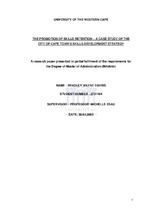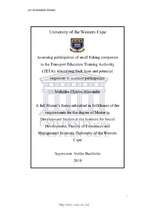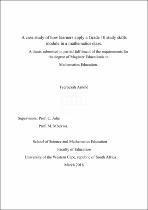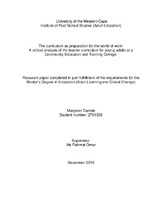The promotion of skills retention – a case study of the city of Cape Town's skills development strategy
Abstract
The lack of skills and capacity has been cited as one of the key reasons for
organisations failing to recruit staff, with 81% of companies in South Africa
experiencing recruitment challenges. More specifically, the problem of low
skills and capacity has had an impact on the ability of the state to meet its
goals and objectives in a variety of public service areas. In fact, in 2006, a
question time session in the National Assembly revealed the enormity of the
problem. The President, while being questioned on the crisis arising from a
lack of suitably qualified people in the Public Service, referred to a skills audit
conducted in 2004. The audit, conducted across 284 municipalities, revealed
the number one challenge in the context of service delivery as that of a lack of skills. In this context, the City of Cape Town has adopted an ambitious Human Resource Strategy. One of the Human Resource initiatives is the Skills
Development Strategy .This broad strategy provides for the implementation of
various interventions that facilitates the development, capacity and retention
of local government officials in the City. This notwithstanding, it would seem
that the City’s remedial action in terms of skills development and retention is
not meeting the prescribed intentions of its HR strategy.The study was guided by the following assumptions:The skills development strategy of the City is aimed at appropriate training and development of local government officials that will facilitate career planning and retention of staff.The City’s broader HR strategies will create an enabling environment in achieving the strategic objectives of the various interventions aimed at skills development and retention.The skills development strategy will enhance employee motivation and loyalty towards the City and hence reduce employment turnover.Successful implementation of the City’s skills development strategy is dependent on effective and innovative human resources policies and
interventions aimed at developing the talent pool of the City.The primary objective of the study was to critically examine the strategic aims of skills development strategy as adopted by the City of Cape Town in 2007.In this regard, secondary objectives include:critically examining the legislative and regulatory framework for skills training and development in South Africa,
critically examining the policy and regulatory framework that informs the
management and development of human resources in the City Of Cape
Town,contextualising the need for more rigorous training and development
interventions within the City of Cape Town,identifying the strengths and weaknesses of the various interventions put in place to facilitate the implementation of the skills development strategy of the City, and finally
proposing recommendations to overcome the implementation challenges.
The research relied on theoretical research methodology to collect data for
the study. Primary and secondary sources of data were used. Secondary
sources included books, journals, and government policies and documents.
Primary sources included interviews and personal observations.
Collections
Related items
Showing items related by title, author, creator and subject.
-
Assessing participation of small fishing companies in the Transport Education Training Authority (TETA): identifying fault lines and potential responses to increase participation
Alexander, Malcolm Charles (University of the Western Cape, 2019)The study focusses on the transport sector, where company participation level is measured at approximately 20% of levy paying enterprises, and this level is mostly based on relatively high levels of participation from ... -
A case study of how learners apply a Grade 10 study skills module in a mathematics class
Arnold, Feeroezah (University of the Western Cape, 2016)A qualitative case study was used to investigate how learners apply a study skills guide during the teaching of mathematics content in a Grade 10 class. A great amount of research and money is continually spent focussing ... -
The curriculum as preparation for the world of work: A critical analysis of the learner curriculum for young adults at a Community Education and Training College.
Daniels, Margaret (UWC, 2020)The main objective of the research is to analyze critically how the curriculum at a Community College in the Western Cape prepares young adults for the world of work in the fields of Travel and Tourism and Small Medium and ...




